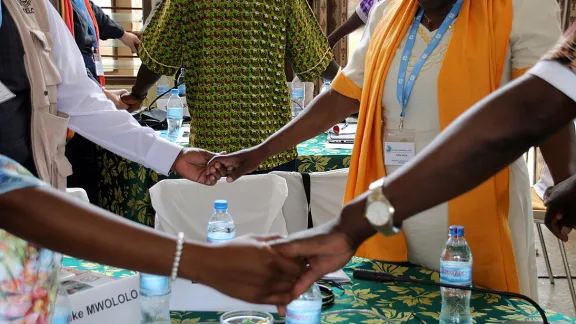
LWF Advocacy Officer Dr Ojot Ojulu took part in the 60th year commemorations of the first all-Africa Lutheran conference. He analyzes the critical need for church advocacy in today’s society.
MOSHI, Tanzania, 3 June 2015 - In May, more than 200 delegates from all the Lutheran churches in Africa and mission partner representatives assembled in Moshi, Tanzania, to commemorate the 60th year of the first meeting of all African Lutheran Churches in Marangu, Tanzania, in 1955. Besides the jubilant and colorful celebratory events, the commemoration also included profound presentations and critical scholarly reflections on some of the contemporary burning issues - political, socio-economic and spiritual - affecting the continent.
When African Lutheran church leaders met for the first time 60 years ago, nearly all of them, except for Ethiopia and Liberia, were under colonial rule. Political freedom was still a dream for many. According to witnesses, some church leaders were granted permission to leave their respective countries on condition that they would only speak what their colonial administrations had instructed them to say at the meeting. For others, on top of other barriers, the logistics of planning a trip from places as far away as Nigeria to then Tanganyika was a nightmare.
A lot has changed
Nonetheless, against all odds, the vision of coming together as African churches galvanized the delegates to overcome each and every obstacle that appeared on their way to the town of Marangu, at the foot of the imposing Mt Kilimanjaro, Africa’s highest mountain. The atmosphere then was in stark contrast to the 20-24 May conference this year, or as some called it, Marangu II. A lot has changed over the six decades since that first meeting, not to mention that all delegates this time came from sovereign independent African states. Travelling within Africa has tremendously improved. Economically, Africa is rising. Politically, the continent is increasingly witnessing peaceful handover of power from one party to another as recently seen in Nigeria, the regional powerhouse.
Challenges amidst progress
However, this good-news is yet to trickle down to the ordinary Africans. Globally, Africa as a region still carries the label of poverty, political instability and gross human rights violations, among other challenges. Even in countries exhibiting economic and political progress, forces of globalization and neoliberal economic policies - free market, privatization, individualism and governments’ withdrawal from the provision of basic social services - are depriving the majority poor of their basic rights to food, water, shelter and adequate standard of living. The privileged few are not only getting richer and richer but they are also wielding political power to their advantage, sadly most often at the expense of the poor.
Prophetic voice
As such, the prophetic voice of the church on behalf of the weak, vulnerable, marginalized, voiceless and the poor in general, has never been as much needed as today in Africa. It was in this context that Marangu II, in its final statement, called upon all African Lutheran churches to “engage intentionally in creative ways the forces that cause and perpetuate injustices” such as climate change, poverty, human trafficking, constitutional abuses both in the church and state, bribery and corruption, land grabbing and illegal mining, among others.
In my view, this represents an important step towards an outward looking church that is well-informed of and constructively engaged in the broader matters for the common good. At a time when many African governments are restricting space for civil society, the voice of the church is critical to keep governments in check, provide alternative narratives and defend the powerless in societies.
Dr Ojot Miru Ojulu is the advocacy officer at the LWF Department for Theology and Public Witness


